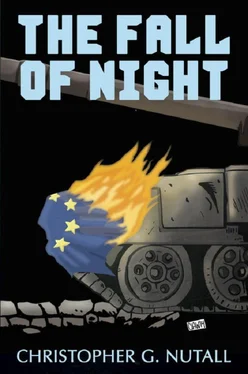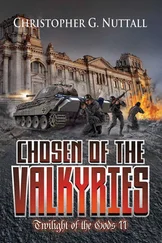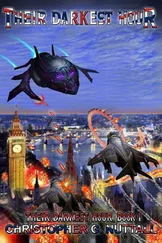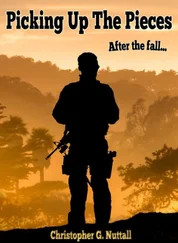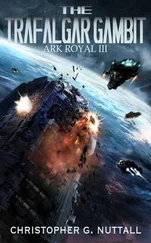“The next people who come along that road,” he ordered, looking down at his veterans and the newcomers alike, “I want you to kill.”
The very horizon seemed to be on fire. He could only be glad that Hazel was well out of the way in Edinburgh; if she had stayed in London, as she had wanted to do to be near him, she might have been caught up in the chaos. The radio reports said that the entire city was panicking and demanding evacuation; there was no way that Britain’s overstressed transport network could move even a small fraction of the city’s population out in time. The noise of guns — Russian guns — and aircraft — Russian aircraft — was a constant crescendo; the Russians had more of everything and it showed. The British forces were operating right at the edge of their capabilities; it wouldn’t be long, one way or the other, before they had to fall back to the line at Dorking. The Russians would probably try to surround the city before actually trying to enter it; Dorking was one of the strong points along the line surrounding London.
“My god,” Sergeant Ronald Inglehart breathed, as they watched the flames growing in the distance. The noise of fighting never faltered; the isolated remnants of British units, trapped and turning like trapped rats to take a last bite out of the enemy before being overcome. The Russians would know that they had been in a fight, not like the Germans or the Poles, where only isolated resistance had been mounted across most of the country. Robinson had been offered a chance to leave the country and had rejected it; like so many others, he would make his stand with his men. “What are they doing in there?”
Robinson had no answer. The Russian jamming was affecting some of their datalinks with higher command, but they had enough information to know that the Russians had secured most of their sea-lanes to Britain and were pouring supplies through the gap; the little left of the Royal Navy was powerless to prevent them. They might not have a port, but they didn’t need one to land some supplies, and given time, they would be able to jury-rig a temporary pier for unloading the heavier supplies. They needed interdiction of some kind, but the Company’s EW officer had reported on the air-search radars and missile launchers that were being set up around the Russian landing zone; an air attack would be suicide with the handful of aircraft that the RAF had left. A suicidal strike mission wouldn’t even get close enough to make the loss of the aircraft reliable; only the RAF at full strength would have had a prayer of success… and that would have cost them dearly.
The noise of a CADS broke the sound of Russian weapons; he saw the flares of its rockets as they lanced off into the sky, tracking an unknown target, perhaps a Russian drone hunting for British forces. The majority of the surviving forces were either trapped in the cities, part of his line, or falling back on the final defence line around London. The Russians had probably done a headcount…
“There,” Inglehart muttered. Robinson blinked, confused, and then he saw the Russian attack helicopter drifting into the air, floating over a force of seven green tanks that were advancing into the English countryside. The force of Russian infantry were moving out in front — it took Robinson a moment to realise that he was looking at a penal unit, not a regular unit — and were marching back and forwards ahead of the tanks. “Mine clearing, sir; I bet you…”
Robinson felt sick. The British Army had a great deal of experience in clearing mines; it seemed that the Russian solution to the problem was to march their naughty soldiers in front of their tanks, down a road that might have been mined. Intelligence wasn't clear on what a soldier had to do to get into a penal unit; for all he knew, the men who were moving slowly along the road had objected to the thought of invading Europe. It was wishful thinking, he had to remind himself; there was no way that a few of the penal soldiers wouldn’t be killed in the firing. Only a politician could believe it was possible to accomplish any such stupid ideal.
He lifted his field telephone. “Fire on my command; firing plan zeta,” he muttered. They’d had the time to plan the action carefully. The war had been unpredictable, but the Russians had to answer to the same basic laws of military logistics, same as everyone else. The British Army had stripped the area of everything that might be useful; if they could give the Russians a bloody nose or two, they would win themselves time…
A little voice whispered at the back of his mind. For what…?
The Russians advanced closer. He would have been delighted to mine the road, but it had been impossible to produce or obtain enough mines for everywhere that needed mining; it had been hard enough to mine some of the most likely beaches that the Russians had used for landing zones. He could hear them now as they came nearer to his position; his people knew the area far better than any Russians could hope to know it without a few years living in the region. He refused to think about the possibility that the Russians might have someone with them who had spent a year studying the possibilities…
They couldn’t have thought that far ahead, could they?
The lead Russian helicopter danced closer. He’d seen the formation before, in the training movies that had covered Afghanistan and some of the African missions the British Army had taken on and won. The real danger to the helicopter was ground-fire; the pilot was remaining over the ground forces to make it much harder for a single British soldier with a Stinger or a different antiaircraft missile to fire on him. Russian infantry, armed this time, were advancing as well… right into the teeth of his trap.
“Fire,” he ordered.
A soldier carrying a Stinger missile fired; the other guns opened up at the same time. The Russian infantry threw themselves to the ground and returned fire, as three of their tanks and the helicopter were struck and destroyed by the British fire. A fourth tank rumbled around the first tank, main gun already tracking on where it thought the attack had come from; the shell it fired missed the British and struck a barn some distance away, sending it up in flames. Robinson could only hope that there was no one hiding in that barn; certainly, no one had had the chance to get out.
The Russian infantry were brave, certainly; even the penal soldiers were showing bravery, though British Intelligence reported the penal soldiers had been warned that they would be shot in the back if they retreated or slowed down. It was a mad way to run an army, but the Russians seemed to use it constantly; they had used the same tactics back in 1945, when they had crushed the SS and moved into Germany. The British soldiers, carefully positioned in their trenches, picked them off until a Russian blew a whistle and the Russians fell back, waiting.
Robinson knew better than to wait to find out what. He muttered an order into his radio and the trenches were quickly abandoned, a handful of weapons left behind on auto-target, scanning constantly from side to side for the first sight of anything moving. Robot guns were rare, because the slightest movement could trigger them into firing, but Robinson was far too sure that there were no longer any friendly soldiers in the direction of Dover. He joined Inglehart in being the last to leave the trench, knowing that most of his soldiers would reach the second set of defence lines, fighting tiny battles constantly to slow up the invasion forces and force them to deploy to fight, all the while buying time…
The voice was back at the back of his head. For what…?
Two black shapes appeared at the corner of his eye, swooping down on their location; there was no mistaking the shape of the Devil’s Cross aircraft as they opened fire with heavy machine guns and small rockets. They wanted to kill every soldier in the trench, he realised, as he threw himself down into a ditch; they had brought along enough firepower to wipe out an armoured division. The explosions finally stopped and they crawled further away, refusing to be dismayed any more than they already were; they would reach the second set of trenches or die trying.
Читать дальше
